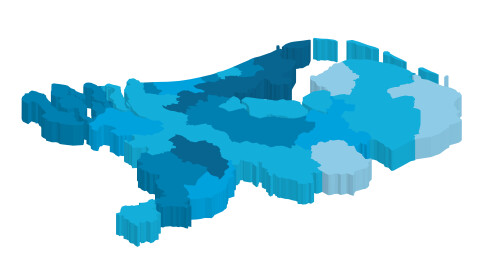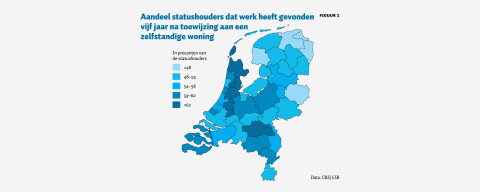
April 26th 2024
Distribution policy inhibits labor participation
- (Dutch) laws and regulations
- Laws & rules
- Understanding & insight
- Job market
In a recently published article in the Dutch journal for policy-oriented economics, Ids Baalbergen and Anet Weterings argue that the dispersal policy of status holders slows down the labor participation of this group (note: this is not about the dispersal policy of asylum seekers). While labor participation should be encouraged.
Please note: this article was translated using a translator appStatus holders are housed proportionately across the country via the dispersal policy. In addition to sharing the burden and maintaining support for the reception of refugees, the assumption is that distribution contributes to the integration of status holders. But is that true when it comes to the chance of work for status holders? Here we share a short summary of the article that Baalbergen and Weterings published (with a link to the full article at the bottom of this page).
In brief
There are large regional differences in the labor participation of status holders.
Status holders have fewer job opportunities in areas with unfavorable social and economic conditions.
The dispersal policy has negative effects on the labor participation of status holders.
Compared to residents without a migration background, status holders have relatively great difficulty finding work. These differences partly arise from the Dutch government's choice to house status holders spread across all municipalities. The characteristics of the place where status holders are housed after leaving the asylum seeker center influence the chance that they will find work.
Male status holders who are placed in regions with a relatively large number of accessible jobs find work faster than other status holders.
The chance of employment is greater for male status holders who have been allocated a home in a neighborhood with a higher socio-economic status.
Female status holders have a greater chance of finding work if they are placed in a neighborhood with a larger number of people with an asylum background.
Labor participation among status holders who are placed in a neighborhood with many other refugees or people from the same country of origin is not lower.
The preoccupation with the ethnic composition of neighborhoods among policy makers seems to divert attention from other, more influential, regional conditions, such as local labor market opportunities.
The government considers work to be of great importance for the integration of status holders. With the action plan 'Status holders at work', the Ministry of Social Affairs and Employment (MinSZW, 2023) therefore focuses on actively removing obstacles in the labor market for status holders. However, the dispersal policy is not mentioned as a possible obstacle in this plan, while status holders experience more problems on the Dutch labor market when they are placed in an area with unfavorable economic and social conditions.
The lower chance of work as a result of the dispersal policy not only has consequences for individual status holders, but also for government finances, because status holders remain dependent on social assistance benefits for longer.

Downsides
At the same time, abandoning the distribution policy has downsides. If status holders are concentrated in those parts of the country where job opportunities are greatest, the pressure on the housing market will increase even further, while it is already highest there. The pressure on other social services - such as mental health care - will also be distributed more unevenly when the dispersal policy is abandoned, while this pressure is currently distributed evenly across all municipalities. Finally, letting go of the distribution of status holders may have consequences for public support for the reception of refugees, which is already under pressure. In short, increasing the labor market opportunities for status holders by abandoning the dispersal policy is at odds with other considerations surrounding the reception of refugees.